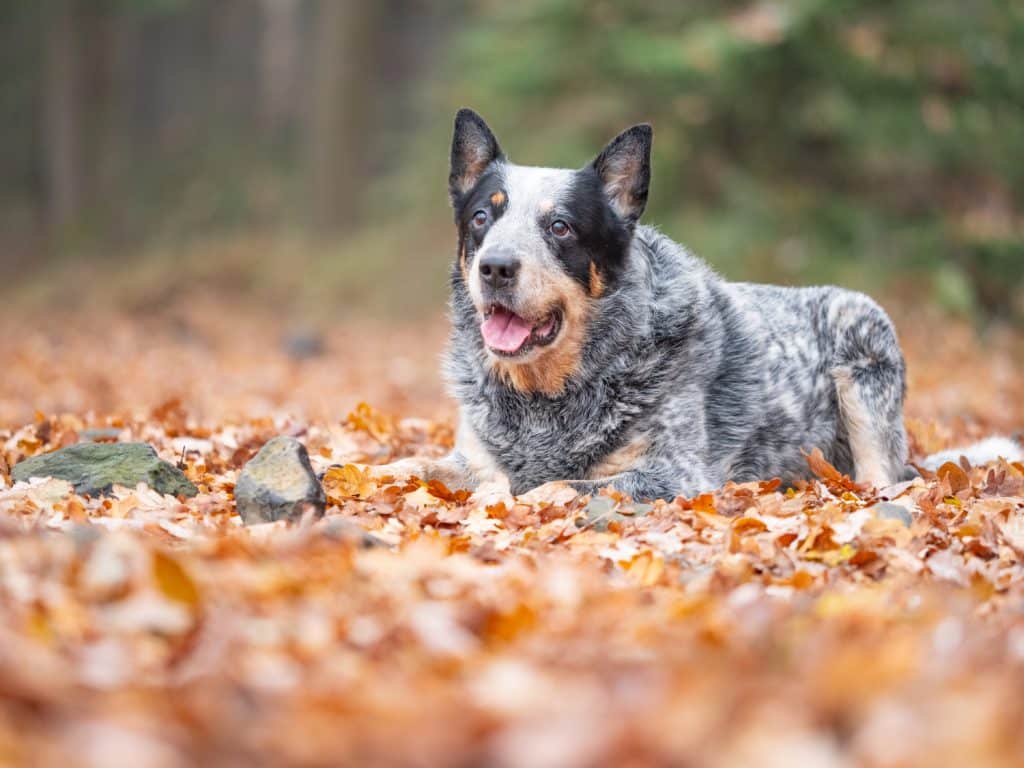
Australian Cattle or Blue Heeler, call it whatever you may, but this beautiful pooch is an epitome of happiness and high-level energy. However, maintaining this high-energy level requires a nutritious and well-balanced diet. These cute-looking dogs can run throughout the day and thus call for a powerful and nutrient-heavy diet to complement their sprightly lifestyle.
As a dog owner or pet parent, you might have little to no knowledge about the breed you share your home with. So, here are some must-know aspects of your Blue Heeler pooch.
| Blue Heelers (Traits) | |
|---|---|
| Life Expectancy (Average) | 12-16 Years |
| Breed Group | Herding |
| Size | Male- 18 to 20 inches |
| Female- 17 to 19 inches | |
| Weight | 15 to 22 kilograms |
| Color | Blue Mottled, Blue, Blue Speckled |
| Coat | Short and Double Coat |
| Temperament | Highly Energetic and Loves Independence |
Now that you know the basic traits of your pooch, you need to keep in mind several considerations when selecting the perfect food for Blue Heelers. This includes health, age, as well as activity level, apart from many more. Unless you have that kind of time on your hand to cook each meal while keeping up the nutrient content to an optimum level, the key is to consider dog foods manufactured by reliable brands. If you own a senior dog with bad teeth, then a Soft Dog Food for Older Dogs with Bad Teeth is your dog’s ultimate requirement.
Here are some of the best options available in the market that would be a great fit for your pooch.
Best for Adults
If you are in need of the best dog food for your adult Blue Heeler, the key is to go with the Bully Max Super Premium High-Performance Dog Food. It is right in protein and fat, along with a meat-based formula that makes it second to none.
Although recommended for adults, this dog food is perfect for Blue Heelers aged 4 weeks & above.
Best for Endurance and Strength
Blue Heelers are notably high-on energy dogs that need similar strength and endurance to keep up their daily activities without any glitch. To ensure that your pooch is upon its protein, vitamins, and other necessary mineral content, the key is to go with Purina’s High Protein Pro-Plan Sport with High Vitality and Energy Support.
Dog food comes in several flavors, which include salmon, chicken, and beef.
Best for Puppies
You need to take care of your Blue Heeler’s diet right from when he/she is a puppy. To ensure that your pooch gets all the important nutritional supplements, you can try out Purina’s High Protein Pro-Plan Puppy Food with chicken and Rice formula. The food also consists of DHA acquired from fish oil rich in omega and antioxidants that help nourish your puppy’s vision and immune system.
Now that you have a good idea about the best dog food for the Blue Heeler, let us look at the factors you need to consider before buying one.
| Image | Brand | Price | Prime | Buy |
|---|---|---|---|---|
 Top Top | Bully Max | PrimeEligible | Buy Now | |
Top Top Top | Purina Pro Plan | PrimeEligible | Buy Now | |
 Top Top | Purina Pro Plan | PrimeEligible | Buy Now |
Product prices and availability are accurate as of the date/time indicated and are subject to change. Any price and availability information displayed on [relevant Amazon Site(s), as applicable] at the time of purchase will apply to the purchase of this product.
Prices pulled from the Amazon Product Advertising API on:Buying Guide for the Best Dog Food for Blue Heeler
As mentioned earlier, there are several factors that come into play when purchasing the right dog food for your Blue Heeler. Some of the crucial ones have been explained here:
1. Minerals and Vitamins
All pooches require minerals and vitamins in order to keep them going and healthy. Some critical nutrients to hunt in your dog food include vitamins A & E along with the optimum dose of calcium, fiber, and so on.
2. Life Stage
Your dog’s age also comes into play when deciding what to feed them. Keep in mind that your dog’s diet at a young age would be much more frequent and nutrient-packed as opposed to a senior or adult dog. While the young one would benefit from fat and protein supplements, the senior ones would benefit from food with joint support & other ingredients.
3. Allergens
Several dogs tend to suffer from sensitivities and allergies that are present in food. It could either be grains, dairy, or even eggs that could cause allergies in your Blue Heeler dog. Luckily, once you have established the reason for allergies in your dog, several dog foods are available in the market free of grains, dairy, or eggs.
4. Avoid Cheap Fillers
When it comes to dog food, there are several options in the market that comes with cheap fillers. Keep in mind that prices that seem too good to be true or are way too cheap would surely come with fillers that are empty calories.
So, make sure you avoid these types of dog foods.
Feeding Your Blue Heeler the Right Way
1. Nutritional & Dietary Requirements
When feeding your Blue Heeler, there are certain things that you need to consider depending on their age.
⇒Puppies —With Blue Heeler puppies, you need to opt for food meant for proper development. In general, the food must consist of 22 percent protein along with 8 percent fat.
⇒Adults — For Adults, you need to select a nourishing diet that supports their naturally active lifestyle. In general, one must go with food that consists of 18 percent protein & 5 percent fat.
⇒Seniors — With the senior Blue Heelers, you need to keep up a balanced diet & avoid adding too much protein too fast.
Besides these things, you must know what your blue heeler really can eat and what can keep him healthy; we recently published a few excellent resources to educate dog owners like Can Dogs Eat Jello, Can Dogs Eat Grits, and Can Dogs Eat Maple Syrup available on the separate page. These will help you to know either you can feed these human foods to your dog or not. Most importantly we discuss when it’s sage to feed human foods to dogs.
2. What Should Your Blue Heeler Dog Food Contain?
Apart from the macro nutritional content, it would help if you also kept in mind several other aspects that make up your Blue Heeler’s food. Here are some things that you must consider:
- Bone Health Supplements: Given the high energy spending done by the Blue Heelers, it is obvious that you would want your dog’s bones to be as healthy as possible. Whether playing with other house dogs or the cattle on your farm, these dogs require enough supplements in order to replenish the lost minerals and vitamins. This is especially true for dogs that suffer from musculoskeletal disorders.
- Antioxidants and Probiotics: Several studies over the year have confirmed that antioxidants and probiotics are very important for Blue Heelers. These add-ons tend to play a critical role in the development of a healthy and rich immune system.
- AAFCO Nutritional Needs: Any type of packaged food being given to your Blue Heeler must come with approval from the AAFCO. Having this seal on your dog’s dry food indicates that it has a balanced and complete collection of nutrients and helps your dog grow in a healthy way.
- Fat and Protein: Although your dog would love to chew on that raw carrot or similar chewy veggies every now and then, this wouldn’t suffice their overall nutritional needs. Keep in mind that canines need a high protein-based diet to maintain a healthy body along with crucial fat content.
Talking about the Blue Heelers, the optimum content of protein and fat should be around:
- 18 to 32 percent protein
- 8 to 22 percent fat
Knowing this all helps you a lot to buy the best dog food for blue heelers.
FAQ's (Frequently Asked Questions)
On average, your dog should be fed about 2.5 to 3 cups of dry dog meal. However, the number can vary depending on your pooch’s size, built, activity, metabolism, and age. Just like humans, every dog has his/her individual needs and might not need the exact amount of nutrition.
The best way to go about it is to get a quick recommendation from your veterinarian.
Just like any other dog, your Blue Heeler could be prone to allergies stemming from certain food variants. It isn’t likely that your dog is suffering from grain allergies, but if you happen to see any kind of skin problem or ear infection, it is ideal for switching to a limited-ingredient or grain-free diet.
Further, you also need to get your dog tested for any grain-related allergies. This would help you avoid any adversities that could happen to your dog, especially if yours is a puppy or a senior dog.
Wrap Up
In general, a Blue Heeler can be considered one of the healthiest breeds that enjoys a lifespan ranging between 12-14 years. However, there are certain health conditions that ail this breed and are inherited from their ancestors.
When planning a diet for your pooch, it is important to ensure the diet helps alleviate the symptoms of the issue he/she is suffering from. The health problems that could ail your pooch include:
- Arthritis
- Elbow Dysplasia
- ACL
- Hip Dysplasia
- Deafness
- Patellar Luxation
- Pyometra
- Portosystemic Shunt
- Spondylosis
- Progressive RA
Being a parent to your Blue Heeler gives you a quick pass to never-ending adventures and freedom from boredom. Given these exceptional qualities packed in by your pooch, you as a parent must pay heed to their nutritional needs.
While home-cooked food is the best, you might not be able to adhere to the pooch’s nutritional requirements just from your home meal. The key is to ensure a fulfilling blend of dry food available in
